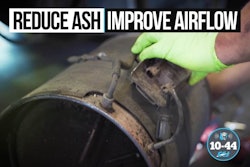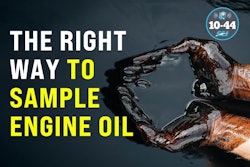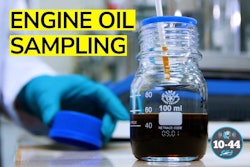This week on 10-44 we discuss the importance of maintaining transmission and differential fluids in trucks. While these fluids have long change intervals, regular inspections and monitoring are essential to catch potential issues early.
Contents of this video
00:00 10-44 intro
00:31 Transmission and differential fluid
02:37 Downspeeding
04:29 Regular inspections
05:32 Best maintenance practices
Speaker 1:
CCJs 10 44 is brought to you by Chevron Delo, heavy duty diesel engine oil. Now, there's even more reasons to choose delo. Transmission and differential fluid aren't something you have to change very often, if ever depending on your trade cycle, but you can't completely forget about 'em. You're watching CCJs 10 44, a weekly episode that brings you the latest trucking industry news and updates from the editors of CCJ. Don't forget to subscribe and hit the bell for notifications so you'll never miss an installment of 10 44. Hey everybody, welcome back. I'm Jason Cannon and my co-host, as always is Matt Cole. Transmissions and rear end oil have a couple of the longest drain and change intervals on the truck. They're not totally set it and forget it though, even if you'll never hit the 200,000 or 600,000 mile mark when you're supposed to change 'em. Weird
Speaker 2:
Noises. A change in shifting characteristics and leaks should be a lighthouse that something is wrong in the gearbox.
Speaker 3:
Even though those AMTs have long air full changes, I feel like it's important to kind of educate fleet managers on what to look for and to monitor these transmission performances. You want to catch these issues early. Look for the shifting. Look for the strange noises like the grinding, the whining, and even the obvious signs like the fluid leaks. I mean, look for that. All that could potentially cause issues with your performance and even the efficiency. Pay attention to your dashboard warnings and also inspections are key. I emphasize that before you schedule any fluid changes, check the levels, check the conditions and all that kind of good stuff that you normally would do. For the pneumatically shifted mts, I would say make sure the air systems are maintained just because if they're not maintained, you're going to see a difference in shifting. It'll be a lot harsher.
That's because also because the water might be some water, some moisture is getting into the system. That's why you may be feeling that difference in shifting field for the electric shifted. mts, keep the batteries in good condition and that's very important. And then obviously looking at the transmission fluids itself or even the scents, if you see it dirty, the smells burned, those obvious signs, it needs to be changed, and another factor is if your truck is carrying much heavier loads and you're doing a lot more stop and go driving, that means that we have to do it much frequently.
Speaker 1:
Rear end gear ratios have been getting numerically smaller for a while because dropping engine RPMs to spin the rear gears faster leads to better fuel economy, but that also changes some of the dynamics in the gear. Case
Speaker 3:
Down. Speeding, like you said it, I mean it's all there to improve fuel economy. It's a trend. We do see it and then going back down, speeding, which lowers the engine. RPM speeding up the rear gears and just put a lot more torque on the differential and transmission. This adds a lot of stress, high operating temperature, and because of that causes the fluids to break down a little faster and needing folks to change out them. More often. The industry, I mean we're generally moving toward lighter fluids to address these new trends. Because of this, the fluids need to have better thermal stability and these lubricating properties to handle all the extra heat from it and the load. Then also moving into synthetic fluids would kind of alleviate that with the higher loads and the temperatures.
Speaker 2:
The change interval for most differential oil is around 200,000 miles, but Ken says there could be signs of problems before that mark that fleets need to pay attention to. He tells us what those are. After a quick word from 10 44 sponsor Chevron lubricants,
Speaker 4:
We serve customers from Birmingham, Alabama to the Gulf Coast, so our people in our trucks are booked solid all day. There is no slack in our schedules. These trucks can't break down. I choose an engine oil that takes care of the number one issue with our engines emissions, so we don't have to worry about DPF clotting. I choose the engine oil that keeps our trucks hauling. I choose delo 600 A DF
Speaker 3:
Regular inspections. Just look for those fluid leaks around the seals because the leaks could cause low flow levels and obviously the damages to your differentials technician. They should also listen to those noises, grinding, winding, which indicate the gears wearing and damages to your bearings. I guess also there's also vibration. Look for that, feel for that, especially when you're turning and accelerating. There will be a difference in the field, and it's also very critical to check the flu conditions. Like said, with everything, if it looks sturdy, if it smells burned, it has stuff in there, metal particles in there or anything, it's time for a change even before your schedule chemical. Then, like I said, the most important is trucks that carry those heavy loads or do a lot of stuff and go driving. We'll need those more frequent changes as well.
Speaker 1:
Best maintenance practices are generally established by the OEM, so always refer to your owner's manual or consult with your dealer, but adding a couple easy layers can make a big difference.
Speaker 3:
These trucks are very advanced, very technological. Now nowadays that regular checks with fluid for contamination, any discoloration and smell it for burnt and any leaks around the seal and are always good. I mean, when these contaminants get into your transmission fluids, it won't lubricate and cool internal parts just as well as a fresh non contaminant fluid. It drops a performance and could lead to whole bunch of problems, more friction, extra heat, fast aware, and some tear, like you said, stick to the manufacturer's maintenance schedule, but be ready to kind of make adjustments based on how the drug's being used and even if they're carrying heavy loads and stop and go driving, that should be considered. Make sure the drivers report any noises, vibrations, any performance issues, and right away that's very important. Like I alluded to just before. Also, I mean, another recommendation that we have is if they're not part of a oil monitoring surveys lab that we have. I mean, Chevron offers lube watch. It can detect where contaminants and before any serious problems arise. I guess the folks have to kind of understand that the truck is a significant investment, is critical for the work and true to care. Keep your fluids changed, and by doing so it'll help your truck run smoothly for many years.
Speaker 1:
That's it for this week's 10 44. You can read more on ccj digital.com. While you're there, sign up for our newsletter and stay up to date on the latest in trucking industry news and trends. If you have any questions or feedback, please let us know in the comments below. Don't forget to subscribe and hit the bell for notifications so you can catch us again next week.










